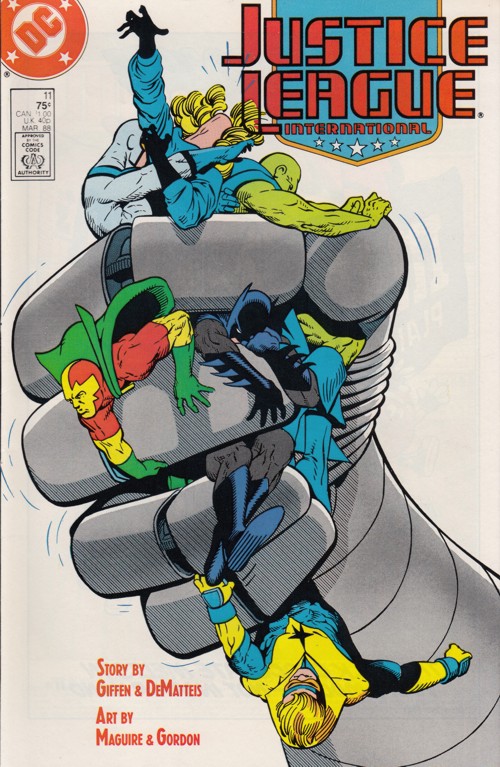
This issue: the Justice League go undercover as Galactus's cock.
It took me way too long to think up a masturbation joke for the cover that I was satisfied with and yet this one still has so many flaws. Like, why would Galactus be in a DC comic book? And why would he mistake a bunch of Justice Leaguer's miming his cock for his penis when he wants to jerk off? So many questions!
The main problem with this version of the Justice League, a version I truly enjoyed when I was a teenager, is that Max Lord is their main enemy. I'm all for stories having twists but you never need the "member of the team turns out to be their villainous foe and betrays them" story arc. The only reason it's a thing is because it's an easy twist if you want to make the audience's jaws drop as they slowly mutter, "Whaaaaaaaaat?" But it rarely ever helps the story. Plus, super hero stories are supposed to be about heroes being heroic and inspiring the world while also saving the world. Who wants to read a story where they're simply all the time saving themselves?! It's annoying. It's why I hate The Joker. Nobody from the last two generations (maybe three!) can even remember a Joker story where the Joker wasn't doing evil fucked up shit expressly to fuck with Batman. If I lived in Gotham, by the eighteenth Joker attack on the city (every one simply to fuck with Batman), I might think about starting a petition to ask Batman to move to Metropolis.
I just finished Jupiter's Legacy on Netflix and it suffers from this Max Lord betrays the group syndrome. Up until the last episode, the conflict is based in the philosophy of ethics between members, and between the older generation and the younger generation. The seemingly main source of conflict is between the way the Utopian thinks heroes should help the world and the way Sky Fox thinks heroes should help the world. In the end, both of them are actually trying to help the world. The conflict is only in degrees and the stubbornness of various men thinking their ideas need to be listened to without any questions. The show ramps up some of the physical conflict with villains, causing a bunch of heroes to die, so that a lot of heroes begin questioning the way they do their job. But ultimately, if the conflict is between Sky Fox wanting to intervene more in non-super affairs and Utopian wanting to stay out of them, the writers (or just Mark Millar? I never read the entire series) realized there wasn't enough meaty tension on that bone. What's going to happen? The Utopian and Sky Fox are going to slowly escalate their voices at each other in a coffee shop in Paris about whose philosophy should be followed? Not good enough! So in the last episode, surprise! One of the Union was betraying them all! What a shock! What a twist! What a needless and stupid moment. The story was so much better when Walt was who we'd been shown he was, and was growing in the way he seemed to be growing. But no. Instead of Walt thinking, "You know what? This works! I'm glad I changed! I'm glad I became a better man!", he was apparently thinking over his entire long life, "I'm going to fuck up these fucking fuckers for not listening to me and shit! Oh boy will I get them good in like 100 years! Idiots!"
Seriously. The story would have been so much better if the interpersonal relationships were worked on and resolved rather than having one of them simply enact their violent revenge plan. But what did I expect?! It was written by Mark Millar, the guy who blocked me on Twitter for saying that his writing suffered when nobody was being decapitated. And yet, look at Jupiter's Legacy?! The writing was actually better until he decided he needed a bunch of decapitations. Man, that guy needs to figure some shit out.
The main problem with this version of the Justice League, a version I truly enjoyed when I was a teenager, is that Max Lord is their main enemy. I'm all for stories having twists but you never need the "member of the team turns out to be their villainous foe and betrays them" story arc. The only reason it's a thing is because it's an easy twist if you want to make the audience's jaws drop as they slowly mutter, "Whaaaaaaaaat?" But it rarely ever helps the story. Plus, super hero stories are supposed to be about heroes being heroic and inspiring the world while also saving the world. Who wants to read a story where they're simply all the time saving themselves?! It's annoying. It's why I hate The Joker. Nobody from the last two generations (maybe three!) can even remember a Joker story where the Joker wasn't doing evil fucked up shit expressly to fuck with Batman. If I lived in Gotham, by the eighteenth Joker attack on the city (every one simply to fuck with Batman), I might think about starting a petition to ask Batman to move to Metropolis.
I just finished Jupiter's Legacy on Netflix and it suffers from this Max Lord betrays the group syndrome. Up until the last episode, the conflict is based in the philosophy of ethics between members, and between the older generation and the younger generation. The seemingly main source of conflict is between the way the Utopian thinks heroes should help the world and the way Sky Fox thinks heroes should help the world. In the end, both of them are actually trying to help the world. The conflict is only in degrees and the stubbornness of various men thinking their ideas need to be listened to without any questions. The show ramps up some of the physical conflict with villains, causing a bunch of heroes to die, so that a lot of heroes begin questioning the way they do their job. But ultimately, if the conflict is between Sky Fox wanting to intervene more in non-super affairs and Utopian wanting to stay out of them, the writers (or just Mark Millar? I never read the entire series) realized there wasn't enough meaty tension on that bone. What's going to happen? The Utopian and Sky Fox are going to slowly escalate their voices at each other in a coffee shop in Paris about whose philosophy should be followed? Not good enough! So in the last episode, surprise! One of the Union was betraying them all! What a shock! What a twist! What a needless and stupid moment. The story was so much better when Walt was who we'd been shown he was, and was growing in the way he seemed to be growing. But no. Instead of Walt thinking, "You know what? This works! I'm glad I changed! I'm glad I became a better man!", he was apparently thinking over his entire long life, "I'm going to fuck up these fucking fuckers for not listening to me and shit! Oh boy will I get them good in like 100 years! Idiots!"
Seriously. The story would have been so much better if the interpersonal relationships were worked on and resolved rather than having one of them simply enact their violent revenge plan. But what did I expect?! It was written by Mark Millar, the guy who blocked me on Twitter for saying that his writing suffered when nobody was being decapitated. And yet, look at Jupiter's Legacy?! The writing was actually better until he decided he needed a bunch of decapitations. Man, that guy needs to figure some shit out.
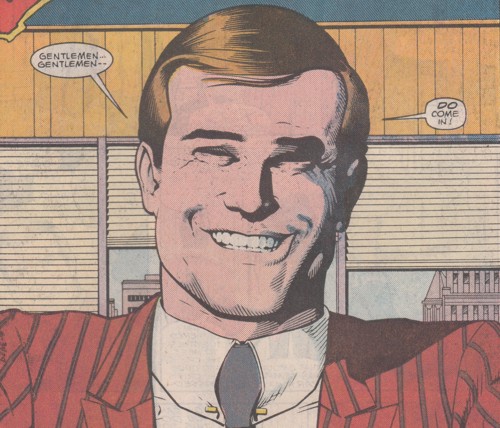
A bunch of office nerds at DC decided this guy was so cool he should be a major DC villain.
What made Max Lord so attractive as the big twist villain to editors, I'm guessing, is that readers didn't care enough about him to suspect he'd be more than some bureaucratic asshole. The editors were right!
Max Lord has called a meeting of all the really powerful super heroes who recently teamed up with the Justice League International to destroy Manhunter World. But when he learns none of them want to join the team (or were available for Keith and J.M. to use in their comic), he flips the fuck out and calls the other members of the Justice League "weak-kneed second-stringers." That seems unfair, especially when he's yelling it in the faces of Captain Atom and Martian Manhunter, two of DC's most powerful heroes. Although they are sort of second-stringers, popularity-wise, right? And maybe they have weak knees.
No, no. I just looked them both up in Who's Who and no mention of weak knees as flaws.
Even if you take out Captain Atom and Martian Manhunter, you still have Batman and Guy Gardner. In whose book are they weak kneed or second stringed? He must just really be angry about having Booster Gold and Blue Beetle on his team.
Max Lord has called a meeting of all the really powerful super heroes who recently teamed up with the Justice League International to destroy Manhunter World. But when he learns none of them want to join the team (or were available for Keith and J.M. to use in their comic), he flips the fuck out and calls the other members of the Justice League "weak-kneed second-stringers." That seems unfair, especially when he's yelling it in the faces of Captain Atom and Martian Manhunter, two of DC's most powerful heroes. Although they are sort of second-stringers, popularity-wise, right? And maybe they have weak knees.
No, no. I just looked them both up in Who's Who and no mention of weak knees as flaws.
Even if you take out Captain Atom and Martian Manhunter, you still have Batman and Guy Gardner. In whose book are they weak kneed or second stringed? He must just really be angry about having Booster Gold and Blue Beetle on his team.
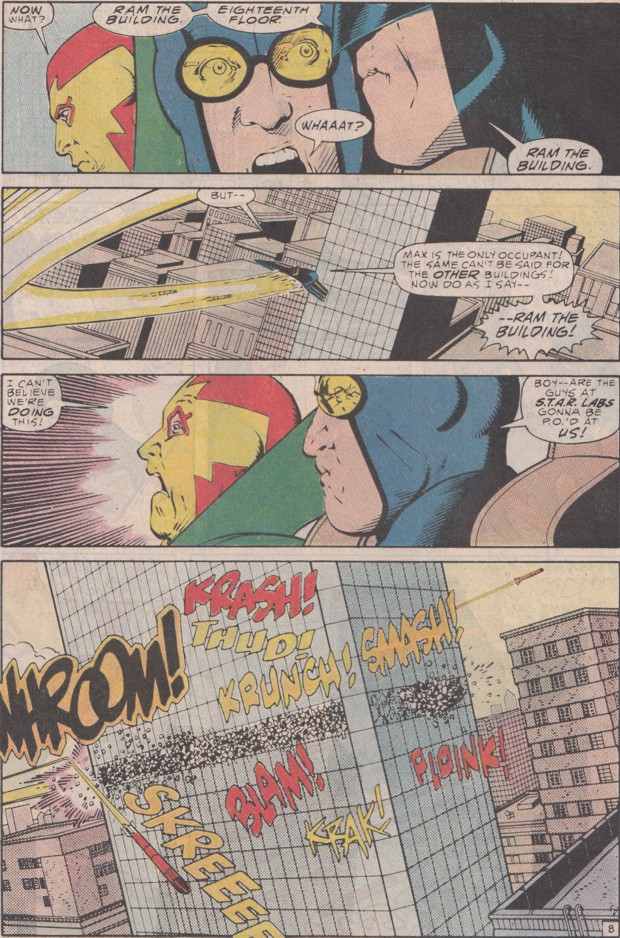
See? Batman's A-list material. Would a weak-kneed, second-stringer have the balls to commit a 9/11?
The building doesn't collapse when Blue Beetle flies the S.T.A.R. Labs ship into it which, I'm pretty sure, is proof that 9/11 was an inside job. Or it just means S.T.A.R. Labs makes a sturdy ship and whoever rents to Max Lord makes a sturdy building. It also shows how Batman thinks he can do whatever he wants which totally exposes him as a rich bastard. Nobody would think Batman's secret identity was some working class jerk after this arrogant and nonchalant display of vandalism. You can tell he's previously paid for this kind of damage without second guessing what kind of trouble he might get into, probably on his last date.
The Justice League have flown into Max Lord's office tower to rescue him, J'onn, and Captain Atom. Some mechanical entity has taken over the building and is trying to kill them. Or maybe it's just pretending because it might be Brother Eye who is in cahoots with Maxwell Lord (unless it's a different robot. All the various DC Universes from the past forty years have all become mixed up together in my memory). I think it's all part of some huge con so Max Lord can eventually put a bullet into Blue Beetle's brain. Which seems like an awful lot of trouble to go through to kill Blue Beetle. I think I could have managed it in three issues.
Guy Gardner kills the power to the building so that Max can explain what's happening without all the toasters and microwaves and wiring trying to kill them. Max tells some sob story about some robot hacking his email or something, and Batman is all, "That sounds like The Construct, an old foe of the JLA!" But then Batman also says, "Max's story doesn't ring true! He's lying about something! It's probably not the Construct at all!" Batman hates being wrong so he just spitballs every theory he can think of. He then finishes by listing all the other characters he can think of. "It's probably Joker! Or it's probably Lex Luthor! Or it's probably Metron!" After the battle, nobody remembers the things he got wrong because he keeps saying, "Remember how I said it wasn't really The Construct? Remember that. Remember I said it was Metron? I said that before the mission. It was a really smart thing I thought of and then said. Does anybody know the smartest type of bat because that's probably the one I modeled myself on."
The Justice League have flown into Max Lord's office tower to rescue him, J'onn, and Captain Atom. Some mechanical entity has taken over the building and is trying to kill them. Or maybe it's just pretending because it might be Brother Eye who is in cahoots with Maxwell Lord (unless it's a different robot. All the various DC Universes from the past forty years have all become mixed up together in my memory). I think it's all part of some huge con so Max Lord can eventually put a bullet into Blue Beetle's brain. Which seems like an awful lot of trouble to go through to kill Blue Beetle. I think I could have managed it in three issues.
Guy Gardner kills the power to the building so that Max can explain what's happening without all the toasters and microwaves and wiring trying to kill them. Max tells some sob story about some robot hacking his email or something, and Batman is all, "That sounds like The Construct, an old foe of the JLA!" But then Batman also says, "Max's story doesn't ring true! He's lying about something! It's probably not the Construct at all!" Batman hates being wrong so he just spitballs every theory he can think of. He then finishes by listing all the other characters he can think of. "It's probably Joker! Or it's probably Lex Luthor! Or it's probably Metron!" After the battle, nobody remembers the things he got wrong because he keeps saying, "Remember how I said it wasn't really The Construct? Remember that. Remember I said it was Metron? I said that before the mission. It was a really smart thing I thought of and then said. Does anybody know the smartest type of bat because that's probably the one I modeled myself on."
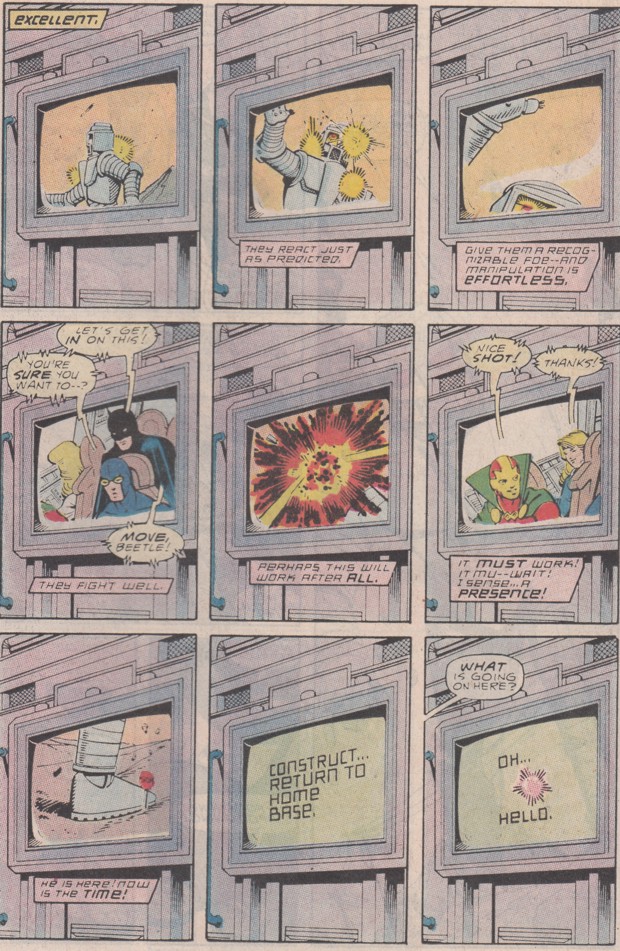
This computer is sneakier than my old Vic-20.
The person the computer is greeting is Metron and it calls him master. Which means this is a computer from Apokolips (or New Genesis). Metron notices it seems to have a new smell of sentience whiffing about it but he's interrupted by the Construct crashing through the wall before he can investigate. That's because this is all part of the computer's plan to free itself from Metron's (or New Genesis's (or Apokolips's)) control. It lured the Justice League and Metron to the same place so that they'll fight and the Justice League will destroy Metron. But that won't happen because Metron has to live for another twenty years so that Batman can sit on his chair and ask the most important question in the universe: "Who is the Joker?!"
The fight doesn't take place in this issue because that might make it too exciting. The Justice League already fought sentient wires and a giant robot. Readers might lose their minds if they also fight a guy in a La-Z-Boy recliner.
Letters this month were from Chris Valin of Colorado Springs, Colorado, Jim Ficken of Wrenshall, Minnesota, Bill Behrens of Chicago, Illinois, Ron Edwards of Chicago as well, Gerry Van Booven of Lawrence, Kansas, Erich Mees of Dunwoody, Georgia, and Jimmie Moss of Baton Rouge, Louisiana. Out of seven letters, not one of them praised letterer Bob Lappan. Maybe that's why he's been replaced by letterer John Workman this issue! Eep!
Justice League International #11 Rating: C. The banter, which was probably a strong point for most people who loved this comic back in the day (and a weak point for people who hated it), has started to get out of control. It's like DeMatteis and Giffen just gives anybody on panel some stupid line to use on anybody else on panel, every panel. It's a little much, especially when Batman begins to get in on it (although Batman likes to think his stupid comments. It's too embarrassing otherwise). I also didn't care for the plot. I'm never fond of villains (in this case, a computer) attacking the super hero team directly. And so far in this comic book, that's mostly what we've seen. Let super hero teams defend the world rather than constantly defending themselves! I know it's much easier to just have the villain attack the heroes because then you don't have to think up a crime for the bad guys nor a way for the good guys to catch wind of the crime (other than passing by a shop window with a television playing a breaking news alert).
The fight doesn't take place in this issue because that might make it too exciting. The Justice League already fought sentient wires and a giant robot. Readers might lose their minds if they also fight a guy in a La-Z-Boy recliner.
Letters this month were from Chris Valin of Colorado Springs, Colorado, Jim Ficken of Wrenshall, Minnesota, Bill Behrens of Chicago, Illinois, Ron Edwards of Chicago as well, Gerry Van Booven of Lawrence, Kansas, Erich Mees of Dunwoody, Georgia, and Jimmie Moss of Baton Rouge, Louisiana. Out of seven letters, not one of them praised letterer Bob Lappan. Maybe that's why he's been replaced by letterer John Workman this issue! Eep!
Justice League International #11 Rating: C. The banter, which was probably a strong point for most people who loved this comic back in the day (and a weak point for people who hated it), has started to get out of control. It's like DeMatteis and Giffen just gives anybody on panel some stupid line to use on anybody else on panel, every panel. It's a little much, especially when Batman begins to get in on it (although Batman likes to think his stupid comments. It's too embarrassing otherwise). I also didn't care for the plot. I'm never fond of villains (in this case, a computer) attacking the super hero team directly. And so far in this comic book, that's mostly what we've seen. Let super hero teams defend the world rather than constantly defending themselves! I know it's much easier to just have the villain attack the heroes because then you don't have to think up a crime for the bad guys nor a way for the good guys to catch wind of the crime (other than passing by a shop window with a television playing a breaking news alert).
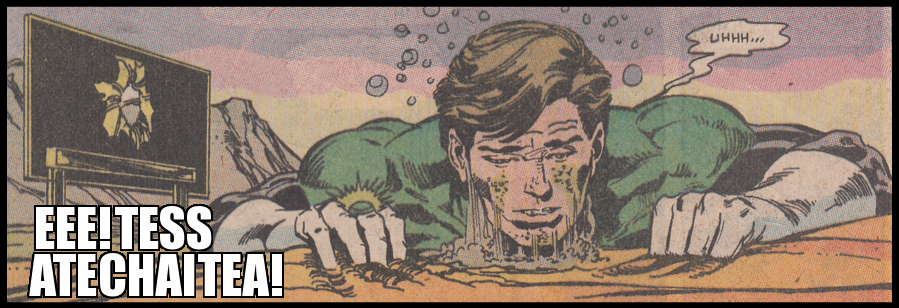
No comments:
Post a Comment